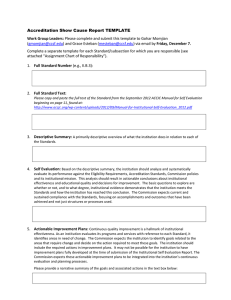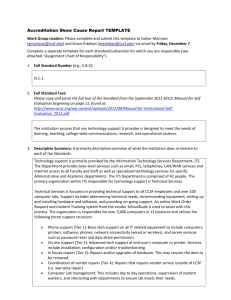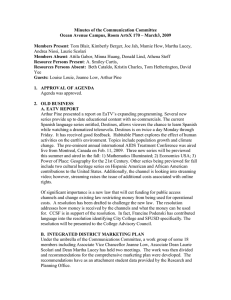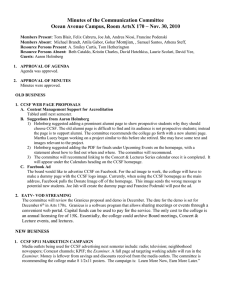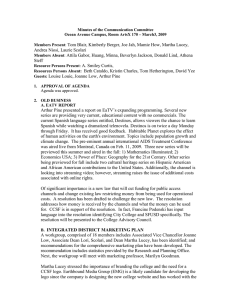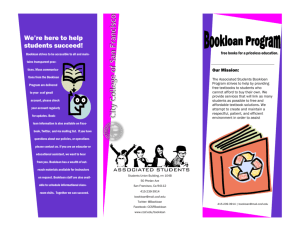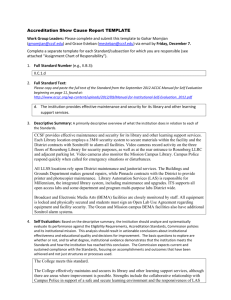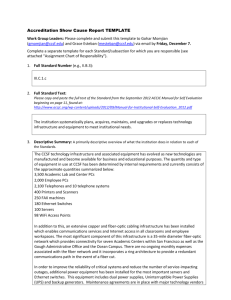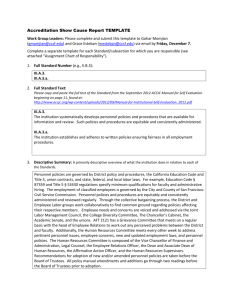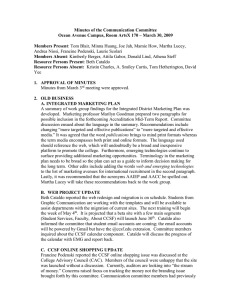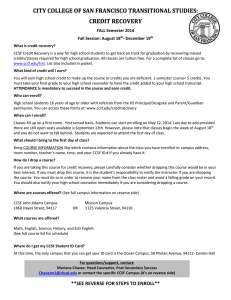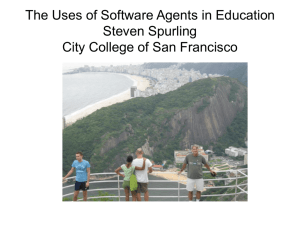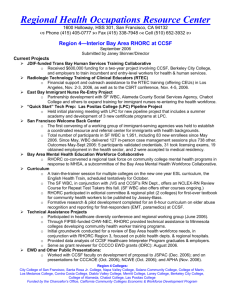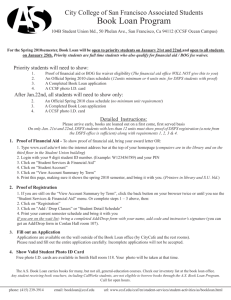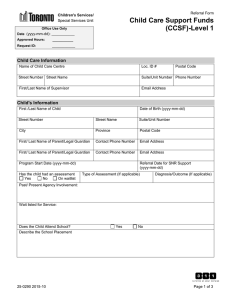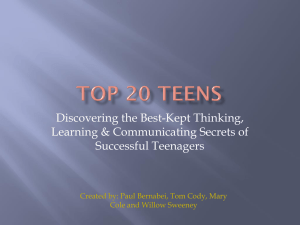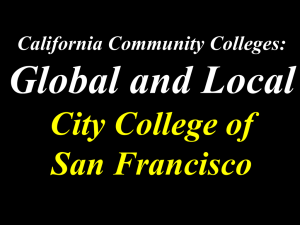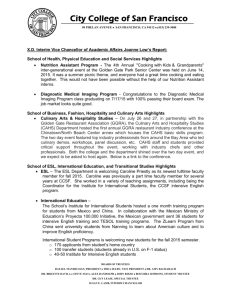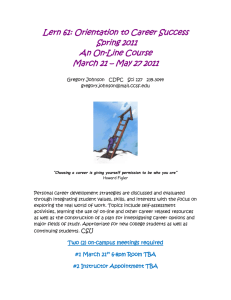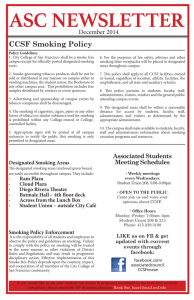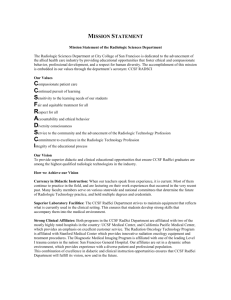Accreditation Show Cause Report TEMPLATE Work Group Leaders
advertisement
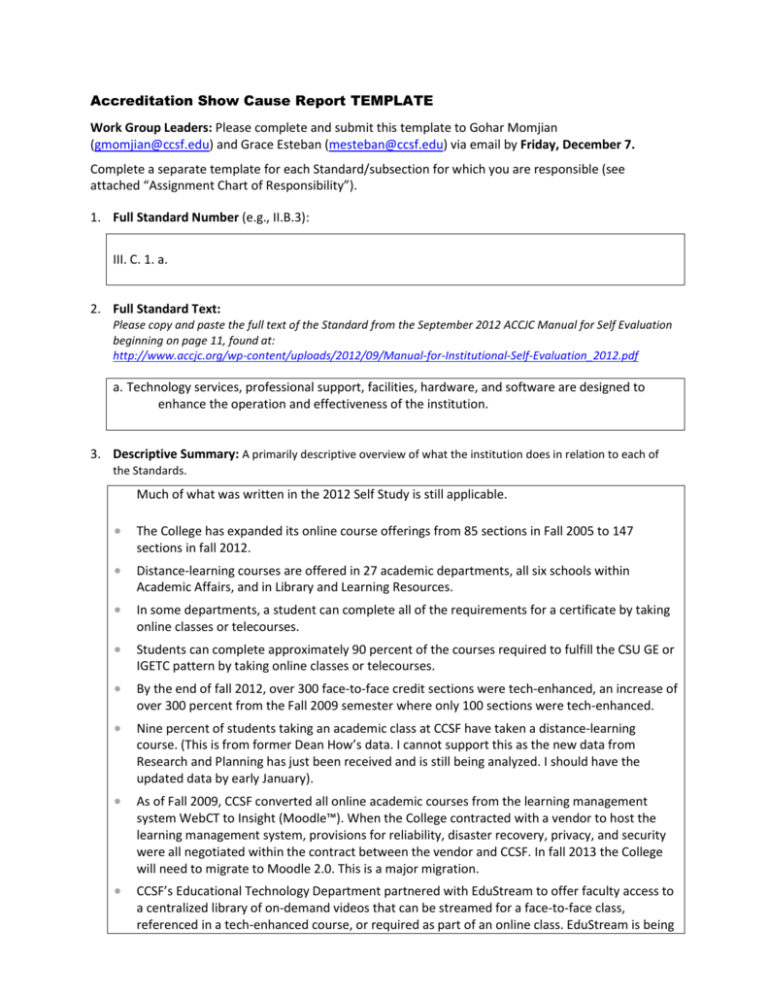
Accreditation Show Cause Report TEMPLATE Work Group Leaders: Please complete and submit this template to Gohar Momjian (gmomjian@ccsf.edu) and Grace Esteban (mesteban@ccsf.edu) via email by Friday, December 7. Complete a separate template for each Standard/subsection for which you are responsible (see attached “Assignment Chart of Responsibility”). 1. Full Standard Number (e.g., II.B.3): III. C. 1. a. 2. Full Standard Text: Please copy and paste the full text of the Standard from the September 2012 ACCJC Manual for Self Evaluation beginning on page 11, found at: http://www.accjc.org/wp-content/uploads/2012/09/Manual-for-Institutional-Self-Evaluation_2012.pdf a. Technology services, professional support, facilities, hardware, and software are designed to enhance the operation and effectiveness of the institution. 3. Descriptive Summary: A primarily descriptive overview of what the institution does in relation to each of the Standards. Much of what was written in the 2012 Self Study is still applicable. The College has expanded its online course offerings from 85 sections in Fall 2005 to 147 sections in fall 2012. Distance-learning courses are offered in 27 academic departments, all six schools within Academic Affairs, and in Library and Learning Resources. In some departments, a student can complete all of the requirements for a certificate by taking online classes or telecourses. Students can complete approximately 90 percent of the courses required to fulfill the CSU GE or IGETC pattern by taking online classes or telecourses. By the end of fall 2012, over 300 face-to-face credit sections were tech-enhanced, an increase of over 300 percent from the Fall 2009 semester where only 100 sections were tech-enhanced. Nine percent of students taking an academic class at CCSF have taken a distance-learning course. (This is from former Dean How’s data. I cannot support this as the new data from Research and Planning has just been received and is still being analyzed. I should have the updated data by early January). As of Fall 2009, CCSF converted all online academic courses from the learning management system WebCT to Insight (Moodle™). When the College contracted with a vendor to host the learning management system, provisions for reliability, disaster recovery, privacy, and security were all negotiated within the contract between the vendor and CCSF. In fall 2013 the College will need to migrate to Moodle 2.0. This is a major migration. CCSF’s Educational Technology Department partnered with EduStream to offer faculty access to a centralized library of on-demand videos that can be streamed for a face-to-face class, referenced in a tech-enhanced course, or required as part of an online class. EduStream is being used by the Language Lab to host their videos. This model could be applied across the curriculum. Online faculty use EduStream to house videos used in their classes. Equipment is now installed in the Multi-media building to prepare for faculty to create video content to place in their Insight shells. The production of video is on hold due to human resources allocation or lack there of. The College makes a commitment to distance learning via Program Review, Shared Governance (ITAC, TLTR, DLAC), Board of Trustees priorities, the decision to create a Chair position for the Ed Tech Department, and the numerous surveys mentioned in C.1. The College contracts with an outside vendor to host its’ learning management system, Insight. The contract with the vendor includes provisions for reliability, disaster recovery, privacy and security. The contract was reviewed by the College’s legal counsel and is in following with standard industry practice. City College of San Francisco makes sure that its technology needs for distance learning are identified and evaluated in a variety of ways: The Employee Technology Survey (the next survey will be administered in spring 2013) TLC Surveys Online Faculty Survey Teaching and Learning with Technology Roundtable Distance Learning Advisory Committee Faculty focus groups Educational Technology Department meetings Feedback from TLC workshops participants Onliners list-serv Institutional initiative for SLOs and Assessment Identified a Distance Learning and Teaching Specialist faculty position to replace the IT position that was moved with the ITS re-organization 4. Self Evaluation: Based on the descriptive summary, the institution should analyze and systematically evaluate its performance against the Eligibility Requirements, Accreditation Standards, Commission policies and its institutional mission. This analysis should result in actionable conclusions about institutional effectiveness and educational quality and decisions for improvement. The basic questions to explore are whether or not, and to what degree, institutional evidence demonstrates that the institution meets the Standards and how the institution has reached this conclusion. The Commission expects current and sustained compliance with the Standards, focusing on accomplishments and outcomes that have been achieved and not just structures or processes used. The College does need to make a stronger human resources commitment to distance learning. Staff have retired or been reassigned from Ed Tech without replacement. The TLC Coordinator position was reduced to a .4 from a .8 for spring 2013. The commitment to distance learning has decreased with this combined loss in human resources. 5. Actionable Improvement Plans: Continuous quality improvement is a hallmark of institutional effectiveness. As an institution evaluates its programs and services with reference to each Standard, it identifies areas in need of change. The Commission expects the institution to identify goals related to the areas that require change and decide on the action required to meet these goals. The institution should include the required actions in improvement plans. It may not be possible for the institution to have improvement plans fully developed at the time of submission of the Institutional Self Evaluation Report. The Commission expects these actionable improvement plans to be integrated into the institution’s continuous evaluation and planning processes. Please provide a narrative summary of the goals and associated actions in the text box below: The College needs to take action and restore vital human resources positions to Ed Tech. Please complete the table below to summarize the goals and actions described above as concisely as possible (add rows as needed): Goal Associated Action(s) Expected Completion Date Restore TLC Coordinator to .8 Fall 2013 Hire DLTS Fall 2013 Migrate to Moodle 2.0 December 2013
